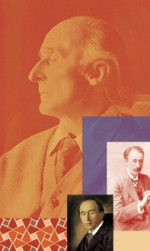 |
 |
Advertise | Sustaining Membership | VAN Store | Feedback
by Stephen Black for Vocal Area Network
Posted June 3, 2009
 On June 10, 1934 (seventy-five years ago almost to the day), Frederick Delius
passed away in his home at Grez-sur-Loing, a small village in rural France that
was home to a thriving artist colony at the time. He was buried without
ceremony in a plot near the village, but later was re-interred in a small
country parish churchyard in England, his homeland. Eric Fenby, a composer
and also Delius's amenuensis in the last seven years of his life, recounts in
his remarkable book Delius As I Knew Him that the re-interrment was accompanied
by an Anglican burial service. That Delius should have been
memorialized with a Christian burial service is quite an oddity, given the
composer's rather outspoken atheism. In the same book an exchange is
related in which Delius chastises the young Fenby at length for his
Christianity, and pointedly calls him a "weakling." The appearance of this
rather charged word in the text of the Requiem (1916) marks the beginning of the
portion of the work which has caused the most consternation and bewilderment
among critics, musicians and Delius aficionados. At this point, not far
along into the first movement, the composer steps into his bully pulpit and
chastises his (presumably religious) audience. It is no wonder that such
an upbraiding would have turned listeners and performers -- still affected by the
Great War -- against the Requiem, even such ardent champions as the conductor Sir
Thomas Beecham, Peter Warlock (aka Philip Heseltine), and Eric Fenby. The
icy reception to the Requiem, coupled with the fact that Delius was not a
careerist, led to a situation in which there were no performances of the work
for over twenty years after its premiere in London in 1922.
On June 10, 1934 (seventy-five years ago almost to the day), Frederick Delius
passed away in his home at Grez-sur-Loing, a small village in rural France that
was home to a thriving artist colony at the time. He was buried without
ceremony in a plot near the village, but later was re-interred in a small
country parish churchyard in England, his homeland. Eric Fenby, a composer
and also Delius's amenuensis in the last seven years of his life, recounts in
his remarkable book Delius As I Knew Him that the re-interrment was accompanied
by an Anglican burial service. That Delius should have been
memorialized with a Christian burial service is quite an oddity, given the
composer's rather outspoken atheism. In the same book an exchange is
related in which Delius chastises the young Fenby at length for his
Christianity, and pointedly calls him a "weakling." The appearance of this
rather charged word in the text of the Requiem (1916) marks the beginning of the
portion of the work which has caused the most consternation and bewilderment
among critics, musicians and Delius aficionados. At this point, not far
along into the first movement, the composer steps into his bully pulpit and
chastises his (presumably religious) audience. It is no wonder that such
an upbraiding would have turned listeners and performers -- still affected by the
Great War -- against the Requiem, even such ardent champions as the conductor Sir
Thomas Beecham, Peter Warlock (aka Philip Heseltine), and Eric Fenby. The
icy reception to the Requiem, coupled with the fact that Delius was not a
careerist, led to a situation in which there were no performances of the work
for over twenty years after its premiere in London in 1922.
Unfortunately there does not seem to be a cogent account of how the so-called "Pagan" Requiem (scored for double chorus, symphony orchestra, soprano and baritone soloists) came to be written. It has taken decades to even determine who the librettist was. The text is now attributed to Heinrich Simon, an accomplished newspaper publisher in Leipzig and admirer of Delius, who met his end in Washington D.C., where he was assassinated on the street by Nazi sympathizers. In the libretto there are many unmistakable references to writings of Friedrich Nietzsche, as well as some shades of Arthur Schopenhauer and even a few loose biblical references. (The first line of text, "Our days here are as one day, for all our days are rounded in a sleep," is a loose re-wording of a similar text in Ecclesiastes.) Delius dedicated the Requiem "to the memory of all young artists fallen in the war." As such, it is significant in that this work appears to be one of the first works that could be called a ‘war requiem'. There would be many to follow, including large works by fellow Englishmen John Foulds and Benjamin Britten. There is some documentation to suggest that Delius was greatly affected by the loss of life during WW I, particularly the loss of young artistic talent. But one wonders if that could have been the sole reason for the composition of the Requiem.
The passage of many years has allowed for an overdue re-evaluation of the musical merits of the Requiem, with the result that more musicians and scholars recognize it to be one of his masterpieces. Andrew Porter, the esteemed British critic, hailed the Requiem as, "the crown of his major compositions." It is certainly more concise and tight than the earlier Mass of Life, and even though the orchestration is large, Delius masterfully creates subtle shades of texture and color borne out of uncloying expressive intent. But perhaps the truest measure is that one gets a real sense of Frederick Delius, both the man and the musician, in hearing the Requiem.
In commemoration of the 75th anniversary of the death of Frederick Delius, Central City Chorus and orchestra presents a performance of the Requiem at Symphony Space, Broadway and 95th Street, on Thursday evening, June 4 at 8:00 PM. The soloists are Jonathan Hays and Elizabeth Farnum, and the conductor is Stephen Black.
Documented performances of the Delius Requiem in the USA
November 6, 1950
The Collegiate Chorale
The National Orchestra Association
William Johnson, conductor
First concert of the AOA 20th anniversary season
Carnegie Hall, New York City
(also on the program, Schubert: Unfinished Symphony)
May 8, 1966
The University Choral Union of the University of Michigan
The Philadelphia Orchestra
Thor Johnson, conductor
Fifth concert of the annual May Festival
Hill Auditorium, Ann Arbor, Michigan
(also on the program, Bernstein: Chichester Psalms; Prokofiev: Concerto No. 3
for Piano and Orchestra)
October 26, 1980
St. Bartholomew's Church Choir
St. Bartholomew's Orchestra
Jack Ossewaarde, conductor
St. Bartholomew's Episcopal Church, New York City
(also on the program, Kodaly: Budavari Te Deum; Gian Carlo Menotti:
O Pulchritudo)
There was also a performance given by the choir of Christ Church Episcopal in
Greenville, Delaware on November 4, 1979. The singers were supplemented only by
organ, harp and percussion.
Stephen Black is the director of the Central City Chorus.